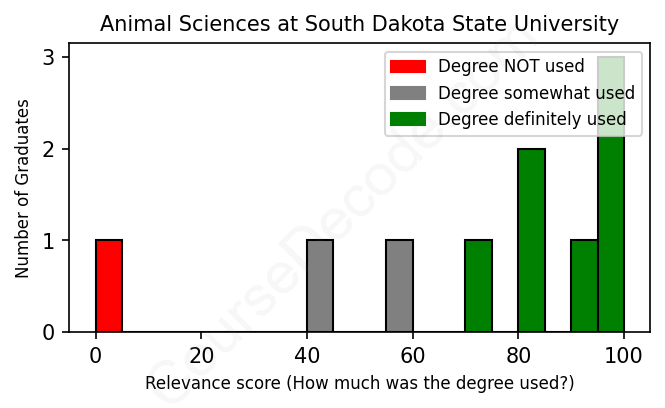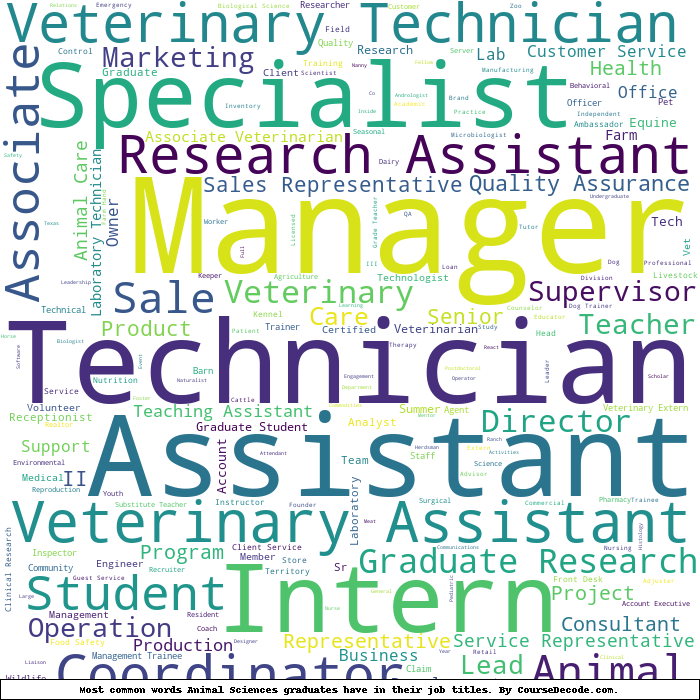
First, some facts. Of the Animal Sciences graduates from South Dakota State University we've analyzed , here's how many have used (or NOT used) their degree in their career:

These are estimates based on AI analysis of 10 LinkedIn profiles (see below).
The verdict? Above average. Overall, with an average relevance score of 73%, Animal Sciences graduates from South Dakota State University have a higher likelihood (+6%) of finding work in this field compared to the average graduate across all fields:
And for comparison, here's the chart for all profiles we've looked at across all degrees.
Also, after graduating, only 10% of these graduates have pursued further education other than another Bachelor's degree (such as a Masters degree or other), compared to the average across all profiles of 35%. This suggests a Bachelors degree is enough for most Animal Sciences graduates, and it's normal to look for work straight after graduation.
See the details:
|
Relevance score: 100% We think this person has gone into a career highly relevant to their degree. We think this person has gone into a career highly relevant to their degree.
DEGREE INFOGraduated in 2021 from South Dakota State University with a Bachelor of Science - BS in Animal Sciences. No other secondary education since. JOB HISTORY SINCE GRADUATIONMicrobiologist South Dakota State University Oct 2021 - Present ABOUTNo information provided. |
The top 10 most common jobs done by the graduates we've analyzed (ranked most common to least) are:
When looking at the career paths of graduates from the Animal Sciences program at South Dakota State University, it's clear that many of them found jobs directly related to their field, particularly in animal care and management. Positions like Cattle Manager, Certified Veterinary Technician, and Herdsman show that a good number of these alumni actively engage in roles that require hands-on animal care and reproductive management. Jobs like the Formulation Specialist at a nutrition company also highlight how graduates utilize their knowledge to develop products that improve animal health. However, not all graduates have stuck to the animal sciences. Some have veered off into unrelated fields like communications or coaching, where their specific animal science training doesn’t come into play as much.
Overall, while a solid chunk of these jobs ties back to animal sciences, there is a noticeable mix of relevance. Many graduates are indeed working in roles consistent with their degree, but there are also instances where their skills and knowledge could be applied in more general areas, showing that the degree can open diverse opportunities beyond just animal management. So, it's a mix of both worlds—hands-on animal care for some and a more varied career trajectory for others. It just goes to show how versatile this degree can be, even if not every job directly uses the specialized skills learned in school!
Here is a visual representation of the most common words in job titles for Animal Sciences graduates (this is across all Animal Sciences graduates we've analyzed, not just those who went to South Dakota State University):

Graduates from South Dakota State University's Animal Sciences program seem to have a pretty diverse range of career paths, but many of them are solidly rooted in fields related to animal care and agriculture. If we look at what people are doing right after graduation, a significant number land roles that are connected to livestock management, veterinary services, or nutrition. For instance, some start as herdsmen, veterinary technicians, or in animal-related communication roles. These initial jobs set a good foundation in the industry and often lead to more specialized positions or even entrepreneurial endeavors down the line. Take the graduate who became the Founder and Owner of The Cowboy Coach after several years as a Formulation Specialist—it's a neat progression that shows how their early experiences laid the groundwork for later successes.
Looking at the five to ten year mark, many alumni continue to thrive within the Animal Sciences sphere. Some move up the ladder in established companies, like the Communications Manager at Christensen Farms, while others branch out into more niche areas, such as research or specialty agriculture consulting. There are also a few who pivot completely away from traditional animal careers, like those who have become CrossFit coaches or fitness trainers, which might not seem directly related to their degree but still keep them engaged with health and performance in some capacity. Overall, it appears that most graduates have found rewarding careers in fields that connect back to their studies, although a small number explore entirely different paths. This shows a blend of stability and adaptability in their career trajectories, making good use of their Animal Sciences degree while also exploring varied professional avenues.
Honestly, a Bachelor’s degree in Animal Sciences can be a bit of a mixed bag in terms of difficulty, and it often depends on your passion for the subject. At South Dakota State University, you’ll dive into a mix of biology, chemistry, and hands-on animal care, which means you’ll have to juggle some tough science classes along with practical work. If you’re genuinely interested in animals and don’t mind hitting the books, you might find it manageable and even enjoyable. However, if science isn’t really your thing, it can feel a bit overwhelming since there’s a fair bit of technical stuff involved. Overall, it’s probably on the harder side of average, especially if you want to really excel and make the most of your education!
Most commonly, in the LinkedIn profiles we've looked at, it takes people 4 years to finish a Bachelor degree in Animal Sciences.
Looking at these Animal Sciences graduates from South Dakota State University, it seems like they’re on a pretty solid path when it comes to making decent money, but it varies quite a bit. Some of them have steadily advanced in their careers, landing positions like Communications Manager and Livestock Production Specialist, which likely come with better pay. Others have taken more entrepreneurial routes, like the founder of The Cowboy Coach, which could mean variable income depending on success. A few are still in entry-level or transitional positions, like the Farm Hand, so it seems they’re still working their way up. Overall, while some are doing well financially, others are still growing and may not be raking in the big bucks just yet.
Here is a visual representation of the most common words seen in the "about" section of LinkedIn profiles who have a Bachelor degree in Animal Sciences (this is across all Animal Sciences graduates we've analyzed, not just those who went to South Dakota State University). This may or may not be useful:

Here are all colleges offering a Bachelor degree in Animal Sciences (ordered by the average relevance score of their Animal Sciences graduates, best to worst) where we have analyzed at least 10 of their graduates:
| College | Score | Count |
|---|---|---|
 Purdue University Purdue University
|
80 | 14 |
 California State Polytechnic University-Pomona California State Polytechnic University-Pomona
|
78 | 13 |
 North Carolina State University North Carolina State University
|
77 | 18 |
 Iowa State University Iowa State University
|
75 | 25 |
 University of Missouri-Columbia University of Missouri-Columbia
|
75 | 12 |
 South Dakota State University South Dakota State University
|
73 | 10 |
 The Ohio State University The Ohio State University
|
71 | 21 |
 University of Florida University of Florida
|
68 | 15 |
 University of Vermont University of Vermont
|
68 | 12 |
 Michigan State University Michigan State University
|
67 | 20 |
 University of California, Davis University of California, Davis
|
66 | 27 |
 University of Illinois at Urbana-Champaign University of Illinois at Urbana-Champaign
|
63 | 16 |
 University of Tennessee, Knoxville University of Tennessee, Knoxville
|
61 | 13 |
 University of Arkansas University of Arkansas
|
60 | 10 |
 California Polytechnic State University-San Luis Obispo California Polytechnic State University-San Luis Obispo
|
59 | 22 |
 University of Wisconsin-River Falls University of Wisconsin-River Falls
|
58 | 10 |
 Texas A&M University Texas A&M University
|
54 | 34 |
 Penn State University Penn State University
|
53 | 14 |
 Texas Tech University Texas Tech University
|
51 | 12 |
 Kansas State University Kansas State University
|
51 | 22 |
 Oklahoma State University Oklahoma State University
|
43 | 16 |